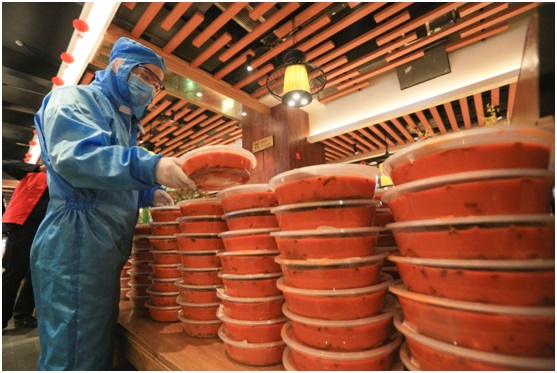By Song Haoxin, People’s Daily
The past Chinese New Year still haunts Wang Wenjun although he and his hot pot business is now feeling a little bit of the summer heat.
The founder of a renowned hot pot restaurant in Chengdu, southwest China’s Sichuan province, was caught off-guard by the sudden outbreak of the COVID-19 epidemic, when he was about to embrace a peak period of his business during the Chinese New Year. And the supposed-to-be busy season of the catering industry soon cooled down.
“I closed my restaurant, and my income came to a halt, but I still had to pay the employees and the rent,” Wang told People’s Daily. Much of his hair went grey due to the concerns over the huge economic losses every day. The electric charge was a staggering number given the refrigerators that stored extra-volume food materials for the Chinese New Year, he added.
To pull his business out of the doldrums became the top priority. He sold his food materials in stock to neighboring residents, even at bad bargains, and asked employees in the city to work in shift. Those outside the city were requested to work from home. Besides, the management board took the lead to lower their salaries, in an effort to further reduce the labor cost.
“The rent of the restaurant remains the largest part of the overhead. I’m really grateful to relevant authorities that helped us save 1.2 million yuan of the rent after negotiating with the property management company. They also offered us preferential tax rate,” Wang said.
Thanks to the destocking efforts, as well as lowered cost and rent, Wang’s hot pot business, which was suspended for over a month, survived though it was hit hard by the public health crisis.
To his surprise, the takeout service, which he had attached little importance to, and the livestreaming marketing, something he had never touched upon, later became an unexpected opportunity for him to revive his business.
As early as 2016, Wang’s restaurant has offered takeout service, but the orders of the service were quite limited back then, as “customers preferred dining-in,” said Wang. However, the service has been surging since the work resumption.
According to a restaurant manager, takeout orders peaked at over 1,500 in a day, with a turnover exceeding half a million yuan.
“I’m craving for hot pot, but I live outside of the delivery coverage, and I can’t make it myself, so what should I do?”
A message left for Wang’s restaurant on China’s twitter-like Weibo had the man contemplating.
He later decided to teach customers to make hot pot on livestreaming platforms, and the idea coincided with that of a streaming service provider. Soon his livestream career started.
His first livestream show attracted more than 87,000 viewers though he rushed to open the channel without much preparation. Apart from the teaching, Wang also sold hot pot seasoning products and self-heating food produced by his restaurant.
The active interaction from the viewers greatly boosted his confidence. He later launched a bunch of activities under the cooperation with local media and completed around a dozen of livestreaming shows.
“The effect was out of expectation, and I’m reached by a number of brands and stores for cooperation,” Wang said.
Another piece of good news came as Chengdu fully recovered its service sector, including the catering industry on March 26.
Seeing the customers waiting to dine at the restaurant, Wang is no longer anxious or worried. However, he still cannot relax.
“The epidemic is a rare stress test, which forces us to think about how we should develop in the new retail industry and exploit the intelligent technologies,” he noted.
An employee of a hot pot restaurant packs hot pot seasoning in Beibei disctrict, Chongqing municipality in southwest China, March 2. Photo by Qin Tingfu/People’s Daily Online












Leave a Comment